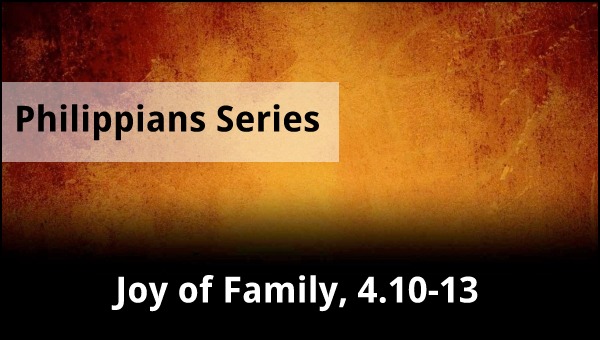By Tyson Thorne

I have great joy in the Lord because now at last you have again expressed your concern for me. (Now I know you were concerned before but had no opportunity to do anything.) 4:11 I am not saying this because I am in need, for I have learned to be content in any circumstance. 4:12 I have experienced times of need and times of abundance. In any and every circumstance I have learned the secret of contentment, whether I go satisfied or hungry, have plenty or nothing. 4:13 I am able to do all things through the one who strengthens me. 4:14 Nevertheless, you did well to share with me in my trouble.
We are nearing the end of Paul’s letter and our study. Today’s passage marks the beginning of Paul’s final salutations and he once more emphasizes his joy in keeping with his theme of rejoicing. Why so joyful? Because his family is there for him. They were willing to help him in ministry at the beginning of his Christian life, and they were still willing to help him though he was a prisoner in a government that was hostile to Christianity. Paul’s fate was unknown, and this truth was ever present. Such times make a man ponder what is really important.
What is important in such moments is the same thing that we recognize as supremely significant at this time of year: family. Before his miraculous experience on the road to Damascus, Paul was a rising star of Judaism. He was both a Jew and a Roman, educated under the finest minds, and was quickly moving up the ranks of the religious system. We know that Paul had to be married to hold some of those positions, and likely had children, though the Bible never mentions them. It is likely that, after he chose to serve Jesus, he was excommunicated from Judaism and rejected by his family. He was left alone by man, left only with a truth about his God that would cost him everything.
With the people of Philippi Paul learned an important lesson, that while blood may be thicker than water, the Holy Spirit is thicker than both. These people, the congregants of his first church plant, were his family. And Titus, Paul’s traveling companion, was more than a fellow minister he was a son. Paul’s traditional family may have abandoned him, but God’s children never would. In this he would rejoice, and there is a powerful lesson for us in all of this too.
At Christmas, we rub shoulders with those we find it easy to avoid during the rest of the year. Old friends we haven’t connected with in years, family members that have wronged us (or perhaps who we’ve wronged) will be sitting at the same table, and suddenly our great day of rejoicing for God’s provision becomes, well, awkward. I’m not going to soft-pedal this; such situations are sin. Jesus taught that even a sacrifice for our sin is not as important as making things right with your brother (Matthew 5.23-24). Jesus taught us that it was insane to ask God to forgive us for something while being unwilling to ask our brother (or sister, or neighbor or spouse) for forgiveness.
If you want to experience the real joy of Christmas, you need to take the time to mend broken relationships. Make things right, even if you are not the person who is at fault. God doesn’t care who started it, he cares that love triumphs. We broke the relationship God had with us, yet looking at all God did to make it possible for us to be at peace with him. We must pursue righteousness, and right-ness in our relationships. We must make peace with our fellow man if we desire to, like Paul, rejoice every time we think of our family. And in case you’re thinking too much time has passed, or it would never work, or it is too difficult Paul reminds you, “I am able to do all things through the one who strengthens me.”
|
|